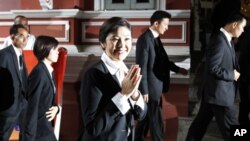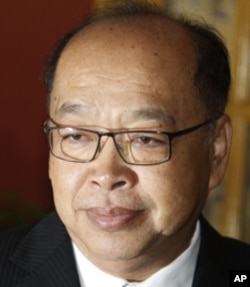The new cabinet of Thai Prime Minister Yingluck Shinawatra has taken shape, dominated by members of her party, coalition partners and a few outsiders.
The 35-member cabinet is expected to soon try implementing populist economic and social policies that helped propel Prime Minister Yingluck Shinawatra to victory last month.
While most cabinet posts were allocated to her Pheu Thai Party or coalition partners, she selected some outsider appointments to key posts of finance and commerce.
Thitinan Pongsudhirak, a political scientist at Chulalongkorn University, said he had hoped for more experienced professionals in the cabinet.
“It falls below the initial expectations. Initial expectations were that they would appoint more outsiders, professionals, policy professionals, but they have ended up with just a few on the economic portfolios, the finance minister, the commerce minister, who doubles as the deputy prime minister," he said. "Beyond that selections were based on party factions and quotas.”
The new government's rise to power comes after a tumultuous period in Thai politics.
Former Prime Minister Thaksin Shinawatra, Ms. Yingluck's brother, was ousted in a 2006 coup because of conflict between his government and traditional elites in Thai society.
Ms. Yingluck's new defense minister is a former general who is viewed as nonconfrontational and is expected to work well with the military.
Economist Somphob Manarangsan welcomed the outsiders on the cabinet, who have financial experience, especially given the uncertain international economic outlook.
“From now on, Thailand is very stable and efficient macroeconomic policy even with the very volatile global financial markets from both the USA and European Union," says Somphob Manarangsan. "That means we have to prepare the country - particularly prepare the macroeconomic policy to be more ready to cope with the effect from the external factors."
Kasikorn Bank economists forecast the Thai economy will grow by five percent next year, fueled in part by government spending on populist programs such as increasing the minimum wage and price guarantees on rice. But Arporn Chewakrengkai, chief economist at the Government Pension Fund, says raising the minimum wage may prove a challenge.
“It is quite difficult to implement because as for the Bangkok the minimum wage is at 225 baht to even go to 300 baht a day, it’s still close to 40 percent higher. But for the other provinces [the wage is] 180 baht, something like that. How she [Yingluck] will bring up that wage up to 300 baht, this is the key challenge,” Arporn Chewakrengkai says.
While economists say higher wages could lead to inflation, the new deputy prime minister says addressing the increasing cost of living will be key for the government.
Political analyst Thitinan says several officials in the Cabinet have close ties to the former prime minister.
“The foreign minister is not an appropriate person for the job. He is unknown as a foreign policy expert. He doesn’t have that expertise, but he does have a direct connection to Thaksin," he says. "The transport minister also has a direct connection to Thaksin. So the omen is not positive because this shows that Thaksin has a long shadow over this cabinet lineup.”
The former prime minister still lives in exile. Despite indications from officials in the ruling party that he and his political allies eventually could be pardoned, the new government has not moved on the issue.
Yingluck Shinawatra has appealed to the public and her political opponents to give her new administration time to show progress on its policies.





